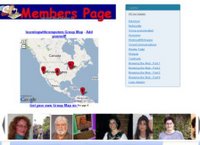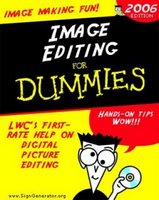Sunday, October 15, 2006
One Thing You've Learned from LwC
Monday, August 14, 2006
FEEDblitz email subscription added!
So have a look at the sidebar and subscribe to Learning with Computers blog NOW!
Saturday, August 05, 2006
Adding multimedia content to your blog
- Now that you have created your blogs, you will want to explore different tools to make them more attractive. You've seen some webtools that allow you to create slideshows. Some other sites provide videos that you can post in your blogs. Let me introduce now a couple of websites where you can create voice posts.
powered by ODEO

While Odeo provides a choice of some different players, this other tool, Podomatic, gives you a link to your recording.

Both tools are free and easy to use. So why not trying them?
http://odeo.com/
http://www.podomatic.com/
Friday, July 28, 2006
Blogging safely
Students should be warned against using offensive language or content and should become familiar with basic netiquette rules. They should be aware about cultural differences. Anonymous posting should be banned. On the other hand they should be aware that anonymity is not absolute on the web and that they may be held responsible for whatever they write.
These are some of the things teachers can do to keep their blogging environment safe:
Set yourself as blog administrator for your students' blogs. This way you can edit or delete offensive content.
Enable comment moderation in the class blog and encourage your students to do the same in their own blogs.
Set up a "comment notification address" to be sent comments by mail as soon as they are posted. (Comments tab)
Set up a BlogSend Address (E-mail tab) to be notified when someone writes a post in your class blog.
There must be other tips more experienced bloggers can suggest.
by Claudia
Are blogs similar to portfolios?
A student's work can not only be collected, edited and assessed in a blog (the same as in a student's portfolio), but it can be instantly published.
The blog develops reflectivity in learners through peer- viewing because peers' comments and criticism can foster students' revision of their own work.
by Claudia
The Blog Audience
Someone who writes a blog is conscious of his/her target audience and not only presumes his/her writing might be read, but expects it to be. This presumption affects the blogger's writing style.
Blog writers are at the same time blog readers. This duality pushes them to write comments to other people's blogs.
by Claudia
The Filter Style Blog vs The Journal Style Blog
A filter style blog is based on creating links with interesting websites and other blogs, thus building a network of multiple voices and perspectives.
A "journal style blog" is motivated by a need of self-_expression.
by Claudia
Tuesday, July 25, 2006
The pros and cons of blogs by Illya
- blogs offer real reading material from real writers, thus reflecting the language actually used
- blogs reflect current topics and there will certainly be a blog for every interest group
- Ts and Ss can negotiate choice of blogs to read for discussion, written work, etc
- Blogs can offer access to the culture(s) of the countries where the language is spoken
- Writing for a real readership may motivate learners to edit and rewrite their work, thus improving their writing skills
- Some learners may find the technical aspect motivating and inspiring
The Cons...
- The level of writing is often not a good model for language learners to read
- Reading on a screen while scrolling does not help to develop some of the reading skills
- Texts are not graded to readers’ levels
- May be difficult to filter out useful material from the huge bank of blogs
- Some learners may feel intimidated when writing for a public readership
- Most blog-types cannot be corrected by teacher, thus bad writing habits may be developed
- Without broadband, viewing or publishing blogs may be extremely time-consuming
- Technological aspect may frighten some learners
Take you time to share your comments and reasons to support your views on this topic
Silvana
What is a blog? by Illya
“… a blog is a dynamic place which is updated regularly (hopefully) and with ease, it is organized chronologically, and its moderation access rights allow multiple authors”
Monday, July 24, 2006
Moving on to Week 2:

After reading the article called Blog-assisted Language Learning (BALL) at
www.teflweb-j.org/v3n1/blog_ward.pdf , which task have you chosen?
You could choose to do at least one of the following tasks:
1- Try to complete the following paragraph.
“… a blog is a dynamic place which is updated ………………………, which is organized ……………………….. and its ………………………….. access rights allow …………………….. authors”
2- Compare a “Send to all email”,a discussion board, a website and a blog as regards audience, voice and content
a-Explain the difference between the filter style blog and the journal style blog
b-Explain why the article refers to the blog audience as anticipated, expected, multicultural and responsive?
c-Compare a portfolio to a blog
d-Explain why the blog develops reflectivity in learners through peer- viewing
3- Make a chart with the pros and cons of blogs for the development of reading and writing skills
4- Explain why netiquette and security are important issues for teachers dealing with blogs
Feel free to share the results of your reading here.
Silvana
Friday, July 21, 2006
Ready for week 2? Let's continue with our trip
Task 1:
Just a quick review to start the next step of our blogging journey
Considering some of the reasons for using blogs in ELT given by the article you have read by Stanley, I would like to ask those of you who have had a try at creating your own blogs to share with us the purpose you had in mind when doing so by writing a comment in our blog at:
http://learning-with-computers.blogspot.com/
I also want you to post the blog address to the group so that we can visit it and see how it fits your goals.
If you have not created your own blog yet, start by taking a tour through those already created and see if you can dicover both the purpose and target audience of the creator.
Hope to read your comments soon
Silvana
Wednesday, July 19, 2006
LwC goes bigscreen

Graham Stanley, one of our featured authors this week, has written, produced and directed this fantastic film with an online tool that will soon become a favourite among LwCers. It's called Zimmer Twins.
Get a big bucket of popcorn and enjoy Graham's online show at http://www.zimmertwins.com/node/238206
Tuesday, July 18, 2006
Week 1 - Task 3 - Reaching the Sky - Blog Set Up
From what we’ve been practicing here, you might have noticed by now that the main aspect of blogging is its interactive feature. People blog for different purposes, be it for personal or professional reasons. Indeed, the “Weblogs” provide a means for a dialogue.
Will Richardson, in his very recent book, “Blogs, Wikis, Podcasts and other powerful web tools for the classroom”, states the difference between a blog and a webpage “…what really distinguishes a blog from your run-of-the-mill Website is much more than process; it’s what you’ll find there. Weblogs are not built on static chunks of content. Instead, they are comprised of reflections and conversations that in many cases are updated every day (if not three or four times a day). Blogs engage readers with ideas and questions and links. They ask readers to think and to respond. They demand interaction.”
Can you see the potential of this Web tool in your classroom?
Well, we were very glad that we could start this talk about blogging with a truly interactive audience. Thanks for sharing your thoughts, doubts and ideas with us! This is not to say good-bye, but just to praise your take off! Now, you are ready to reach the sky.
Below, you’ll find some examples of different types of blogs in the classroom according to Aaron Campbell (2003), cited in Graham Stanley’s text. Explore these examples as you wish and relate them to your own setting and your students’ objectives and needs.
The Tutor Blog
http://top21.blogspot.com/
- Professional Development
http://blogenough.blogspot.com/ Collaborative Blogging
http://ctjonline.edublogs.org/ – Workshop on Blogging
The Class Blog
http://virtualnewyork.blogspot.com/ Virtual Trip to NY
http://ctjonline.blogspot.com/ - Reading Project ( The Pit and the Pendulum)
- International Exchanges
http://brazilargentina.blogspot.com/ Brazil and Argentina
http://mechanicaltorpedoseahorse.podomatic.com/ Brazil and Portugal
http://internationalexchange.blogspot.com/ Brazil and Arizona
The Learners blogs
http://shota.eslblogs.org/ - Aaron Campbell’s student
http://kamiiille.blogspot.com/ - Bee Dieu’s student
http://belhassens.blogspot.com/ - Bee Dieu’s student
http://berti01.blogspot.com/ - Bee Dieu’s student
_________________________________________
Ready to set up a blog?
TASK 3: access http://www.blogger.com/ and create your own blog.
Share with us the link to it, your first impressions and questions.
If you already have a Blogger account, share the link and your experience with it.
We want to know it all!!!
We’ll be around to help you out, and, on Thursday, Silvana Carnicero will take the lead.
Thanks for your enthusiasm.
Carla and Erika
Friday, July 14, 2006
Week 1 - Task 2 - Texts - Blogging Itinerary
 Dear all,
Dear all,Just like anything on the Internet nowadays, everything is fast paced and response can be immediate! Blogs are one of many tools that gives people the chance for a dialogue. Thanks for you who have already contributed to our discussion and seem so interested in the topic!
To move on, we need to understand some key concepts to order our thoughts and to structure our actions towards this fantastic Web tool.
The texts will let us choose the best "flight itinerary" for us and our students. We'll also provide you with a wealth of worth-reading resources suggested by Teresa Almeida d'Eça, a fantastic online tutor from Portugal.
So, get yourself comfortable and enjoy the readings.
Text 1 - Blogging for ELT
Graham Stanley, British Council, Barcelona
http://www.teachingenglish.org.uk/think/resources/blogging.shtml
Text 2 - EFL/ESL Classroom Blogging: A Comparative Review
http://tinyurl.com/o6fwc
After exploring the texts,
- Where would you like to start? Which bloghosts will you explore? Why?
- Why blogging in the classroom?
- What aspects should you consider when blogging?
Extra readings - Teresa's Suggestions:
See you around.
Carla and Erika
Thursday, July 13, 2006
Week 1 - Task 1 - The Blogging Take Off
 About us
About us We have been teaching English at a Binational Center in Brasília for seven years. We are responsible for the school computer lab and website. We've been working with online collaboration and spreading the word about the benefits of technology in language learning. We'd like to share with you our enthusiasm towards blogging. Since we've started blogging with our students and friends, our classes haven't been the same! We haven't been the same. Now, we can have our voice online and give the power of speech to our students, too.
So, let's start this week by sharing our own ideas and experience on blogging. If you are a totally newbie to this concept and the tool, don't worry. By the end of this week, you'll be a blogger! By the end of five weeks, you'll have a whole new perspective on the infinite possibilities of uses you can give to Blogs.
_____________________________________
So, Let's take off! Please, take your time, click on the "Comments" area below, and share with us what your thoughts are.
Have you ever blogged for fun?
Have you ever blogged with your students? Why/why not?
If you have blogged, which bloghost do you use? Why did you choose it?
Our group has a Wiki. Can you tell us the difference between a Wiki, a Webpage and a Blog?
Do you have any idea of what you can do with a blog in your classes?
If you are not a member of Blogger, write your comment, choose the option "Other", and write your name. We're waiting for your views on the topic to start off!
Carla and Erika
Two Brazilian Blogger-Teachers!
Week 1 - Task 1 - Bee Dieu's Contribution
There are a lot of resources on blogging in the Blogstreams Salon group at Tappedin (which you can join for free) and also in the navigation column of "Building a Community of Practice" blog http://evo05.blogspot.com/ (interviews with guest speakers, links to the common wiki).
Dekita also sports some articles on blogging in EFL (see articles tab) and you can send us information about your classes who are blogging so they are in the repertoire (see exchange tab) for other teachers/students to interact with. The orchard tab takes you to class posts from different parts of the world .
I would also like to share two films about school with you. One is a 20 minute interview with Ken Robinson which is inspiring and uplifting (to be viewed first)
http://www.ted.com/tedtalks/tedtalksplayer.cfm?key=ken_robinson
and the other an example of the darkest English humour to contrast (or exemplify)http://www.flabber.nl/archief/016805.php#dating
I am sure you will all have a great experience and loooking forward to putting your students in contact with mine and others.
Warm regards from Brazil,
Bee
Barbara Dieu
http://dekita.org/
http://beewebhead.net/
Saturday, July 01, 2006
May-June

As this post corresponds to the period that begins May 1st, let's share this text by Dennis in which he describes how Germans celebrate that day:
I trust all list members are happily enjoying whatever you do in your part of the world on May 1st. In Germany young people load small wooden trolleys with lots of beer and walk in the woods getting drunker and drunker. I must ask my wife what it is all about....Ah... Adults march in their trade unions about earnest matters like pay and pensions and younger people have somehow updated dancing round the maypole and celebrating spring by disappearing into the woods and transfering the beer in the bottles into themselves.
Having been exposed to night and day reports from Germany this past month, we have all witnessed to what extent beer is part of all kinds of events nowadays. Whether it is nightlife or sport, everybody you see is holding a can or a bottle in their hands. Not that it is an exclusive German phenomenon. Here in Argentina the scene is not too different. Drinking beer is a favourite pastime with young people. If there's no beer, there's no fun. And this seems to be a worldwide concept.
You must be wondering what this has to do with Learning with Computers.
Basically all human behaviour has to do with LEARNING. Evidently mass media are
doing a far better job than educators at modelling attitudes and thoughts. We
are lacking impact and our message is not getting through. Just food for thought.May was "Browsing the Web" month. We discussed how to evaluate websites, shared some useful tips about safe and fast surfing.
After so much "sport" we settled down to discussing wikis. Our PBwiki has proved to be a useful tool to collect and organize all the information we have been building as a group. I'm sure quite a few of us have felt encouraged to create our own wikis to work collaboratively with colleagues and students. At the same time
some tried their hand at creating quizzes, which should be included in our list of to-do's, shouldn't it? I'm behind the group in this.
Another two months have gone by. Half of 2006 has vanished. I'm looking forward to what this group has in store for the months to come.Image: http://www.nataliedee.com/
--;-<@ Claudia @>-;--
Friday, June 09, 2006
Groups that work
Laura Szmuch and Jamie Duncan have just released their latest issue of RTNews - A magazine on Neuro Linguistic Programming in Education. In this month's article, they discuss: what makes a group function well together? Reading them, I thought of Learning with Computers, and felt eager to share the following extracts with you:
Using an NLP perspective, we can observe what works in productive and positive teams. In these, the members share a common purpose, which provides the motivation and sense for being together. They are often homogeneous groups, at least on the surface. We tend to work better with people that are like us, that we have things in common with and who we feel understand us. Groups where the members consider they have a voice and equal rights combine better than those in which the power is concentrated in the hands of a few. Perhaps the few have the power today, but there is the expectation that it will be shared around on a regular and systematic basis ... At a more sophisticated level, most students of group theory also point out the need for a group to contain people playing diverse roles – like the initiator, the details wizard, the motivator, the mother or father figure, etc.
And here comes the most interesting part (to me!). They tell us group cohesion does not depend exclusively on the teacher/moderator, but all members can contribute to it! How? Have a look at some tips for us all to bear in mind!
- Be really aware of all the members of the group. Make sure everyone feels part of the bigger unit and that their contribution is recognised not only by group leaders but fellow members as well.
- Ensure that the group has time to be together alone to work on the task in hand. If there is no stability of membership, it makes it very difficult to forge a working team.
- Check if the members are happy with the progress. If discontent is related to something to do with the functioning of the group, the quicker this is acknowledged, the better.
- Where appropriate and possible, foster a sense of equality. A good attitude to develop is that we are all equal shareholders in the outcome of the group’s work, we are all contributing to the task and each has a role to play. It helps to establish how each member will be better off or satisfied by the group achieving it’s goal. If the accountability falls on the shoulders of one or two people or if only they are to reap the rewards, these people have to recognise the help they have had. As flat a hierarchy as possible tends to function better.
- Maintain a flow of communication and clearly establish how and when members can talk to each other as a group.
- Be open about difficulties and obstacles facing the entire team and its project. If there are constraints of time or resources, these should be admitted openly. History has shown many examples of people working together in adversity when they know what they are up against (perhaps you've heard of the Dunkirk spirit?) .
- Groups often stick together because of the shared humour, the jokes, the nicknames and the experiences they have in common. Encouraging this as a group member can be very rewarding.
- Play to the strengths of the individuals. If one person is the mothering type and the others respond to this, let it happen. If someone is the bossy one and the group appreciates this, great.
And they finish telling us:
Groups are like individuals. Every one is different and they are always constantly changing. Nonetheless, much of what we have successfully achieved on this planet is the result of group work and it makes sense to nurture a positive and cooperative group spirit. Most of all, the sense of achievement gained from having worked together on a project can be one of the most enriching human experiences possible. |
Good time to say: Thanks for the enrichment you've brought to my life, group members!
Gladys
NOTE: RTNews is emailed monthly for free. You can subscribe by sending a mail to: rtnews@resourcefulteaching.com.ar with your name and city stating 'subscribe' in the subject box)
Sunday, May 21, 2006
March-April

As you can see, my initial plan of writing a monthly entry has already gone to the dogs. Unlike most of you, who are already in the final stage of the school year, here (I mean in the bottom part of the planet) we are just beginning, adjusting to new timetables, trying to put papers in order, making room for more paper, going over last year’s class plans and projects to see what we keep and what we do without. And on top of all this, just like you all, we’re keeping up with e-mails, making new friends and new knowledge.

On the other hand, the wiki has proved to be an excellent collaboration tool. It’s easy to create new pages, edit them and add them to the sidebar. All of us have been able to leave our signature in one or more pages. It’s nice to see the wiki grow week after week, a big intercultural puzzle made up of big and small pieces, all equally important for the global picture.

Finally, having weekly tasks keeps the group moving all the time. All the members are involved doing what they can, or interests them most, and receiving positive feedback for what they do and no dressing downs for what they don’t. Can we expect more of a learning environment?
Working with images, voice and text mail along these two months has allowed us to experience multimedia in communication technology. I bet quite a few of us have discovered new and rich ways to get across to loved ones as well as students and colleagues.
 As an add-on to all our “academic” work, we have been introduced to the world of widgets by hard-working mother-of-six Teri. We are all looking forward to a new round of widgets. We hope Teri is back on the list soon after “getting her kids through their final exams.” In the meanwhile, I've found a new one by Frappr, which is in Beta version and which we could try here: the chat box, which you'll see in the sidebar. Let's see if some of us meet in blogosphere for a chat!
As an add-on to all our “academic” work, we have been introduced to the world of widgets by hard-working mother-of-six Teri. We are all looking forward to a new round of widgets. We hope Teri is back on the list soon after “getting her kids through their final exams.” In the meanwhile, I've found a new one by Frappr, which is in Beta version and which we could try here: the chat box, which you'll see in the sidebar. Let's see if some of us meet in blogosphere for a chat!Isabel and Dennis have taken over our social bookmarking. Each of them has chosen a different tool -Blinklist and Del.icio.us –and carefully gone over hundreds of messages to get all the useful links contributed to the list conveniently organized and tagged.
As Dennis himself put it in one of his messages: “'I love about this list is that there are people on it who DO things”.
(='.'=)
(")_(")
Friday, April 14, 2006
Another Star in Cyberspace

Gladys Baya, an EFL, teacher trainer and computer fancier from Buenos Aires, Argentina, decided to create Learning with Computers Yahoo! Group by the end of February 2006, to cater for those language teachers in need of basic training in the use of Internet-based tools. Having been a member of Webheads in Action since 2005, she realised many participants in annual EVO Sessions felt overwhelmed by the unintelligible techie jargon of initiated participants and chose to remain in the background. There she saw fertile soil to plant the seed of cooperative technology training and discussion.
As soon as I got to know of Gladys's initiative, I jumped into the action. I've known her for a few years but have started regular communication with her since our "virtual" meetings in this year's Becoming a Webhead sessions, where she was a co-moderator for one of the weeks and I, a first timer.
Not many English teachers in our area think it is worthwhile to spend free time exploring new technologies. But we do. And a small bunch of others out there do too. Facing the impossibility of f2f teamwork, we have found CMC (computer mediated communication) a useful bridge to get to other like-minded people all over the world and break free from isolation. Thanks to this, our individual efforts can find echo in big communities who are ready to help, encourage, comfort, guide.
Gladys has confided me the task of setting up this blog to record our development as a community of teachers/learners. Each and every one of us has something to learn from the group as well as many useful contributions to offer. Even when we ask a question we are providing others with the chance to reflect on some issue. Isn't that important?
Let's use this blog to keep a record of our memorable moments as members of this community, of our "Eureka!" moments and frustrations. I bet there will be many.
I expect you to make this blog yours, that is, ours.
Claudia

